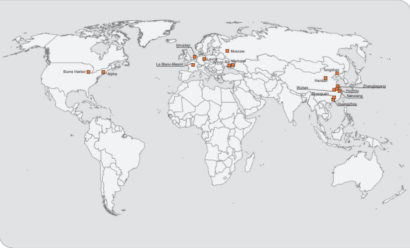
Editing by Li Panpan
The war in Ukraine and sanctions on Russia are causing disturbance to the global special gas market, making some Chinese companies more valuable, JW Insights analysts observed.
Ukraine is a global supplier of neon gas, which is of great significance to the semiconductor industry. The country provided 70-75% of the world’s total around 2015. Neon gas is the core consumable of the light source for DUV lithography machines. In recent years, China has become a supplier with an export volume of 65,000 cubic meters in 2021.

Generalized map of crude neon purification plant sites
Source: German Mineral Resources Agency
Lithography giant ASML clarified that less than 20% of the neon gas it uses comes from Ukraine. It also stated that it is looking for more diverse sources of neon gas supply. China’s suppliers may have the chance.
Chinese electronic special gas supplier Walter Gas (华特气体) is a good example. Its lithography gas products passed the product certification of ASML in 2017, with more than 80% of customer coverage in Chinese IC manufacturers over 8-inch fabs. It has entered the world’s leading semiconductor enterprise supply chain.
The company saw a 15% increase in its stock price on February 24, when Russia announced the military operation in Ukraine.
Another listed company, Kemet Gas(凯美特气), has also laid out plans in the field of lithography gas and has reached a strategic cooperation agreement with NTU, a Chinese photoresist manufacturer.
In the special gas market, the real dominant suppliers are companies like American Air Chemicals, Germany’s Linde, Japan’s Ramen Dayo, and France’s Air Liquide. The current geopolitical situation may lead to new changes.
The U.S. applying foreign direct product (FDPR) rule on Russia will create a vast market space when companies from Europe, the U.S., Japan, South Korea, and other countries withdraw from Russia. The country’s ICT industry would be incompetent to handle so many businesses.
This might bring another round of opportunities for Chinese semiconductor companies.
RELATED

No Data Yet~
READ MOST

No Data Yet~







